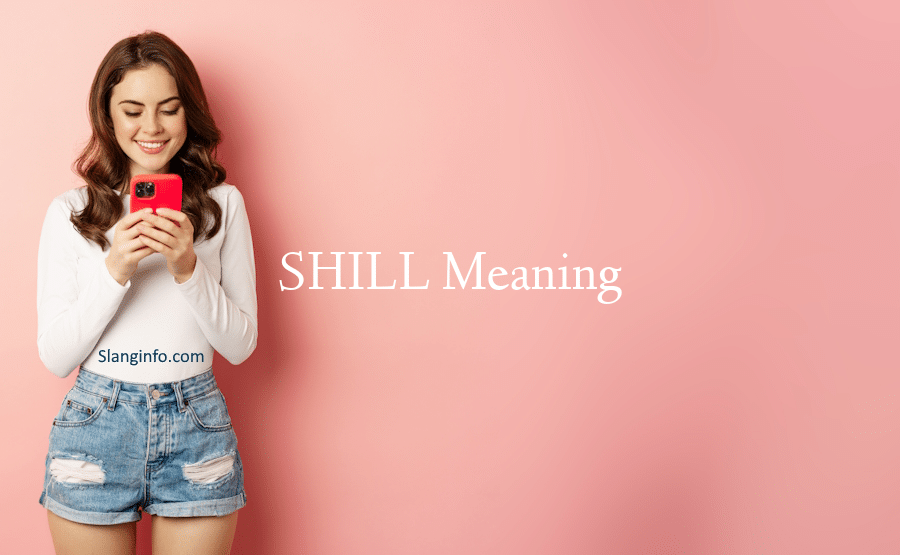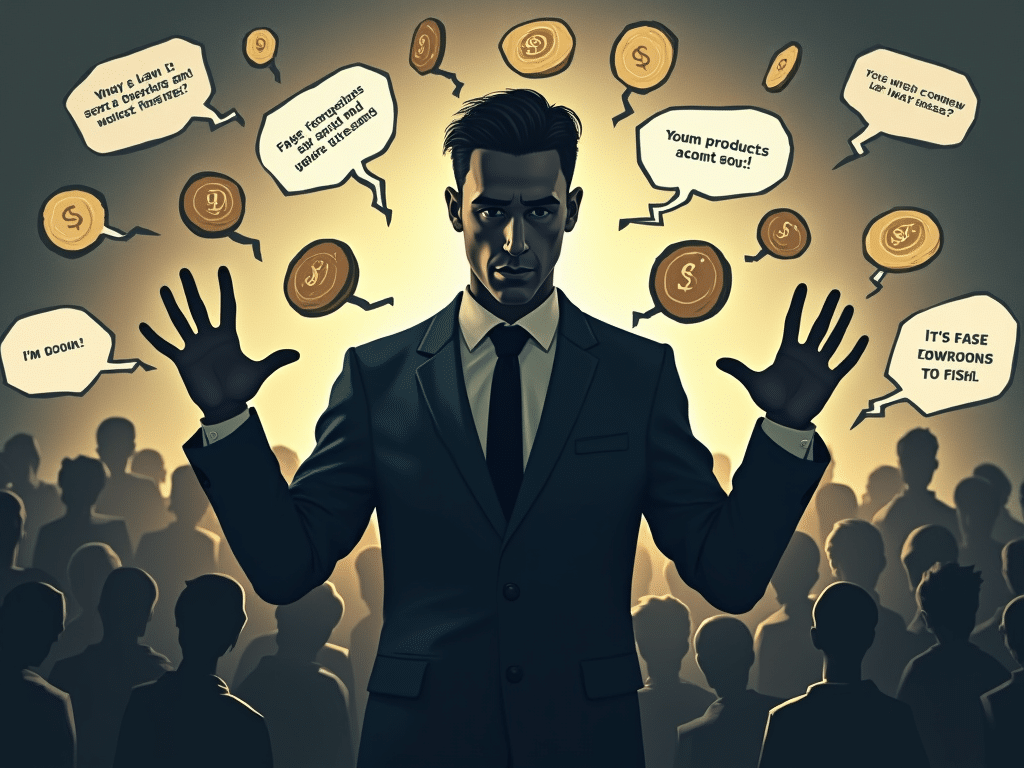Ever scrolled through social media and seen someone raving about a product like it’s the best thing since sliced bread? Chances are, you might have encountered a shill. The term “shill” has become increasingly common in the online world, especially in cryptocurrency and marketing circles. But what exactly does it mean, and why should you care? Let’s dive in and unpack this sneaky practice.
| Key Takeaways |
|---|
| A shill is someone who promotes a product or idea for their own benefit |
| Shilling is common in cryptocurrency, marketing, and social media |
| It can be paid, self-interested, or sometimes unintentional |
| Recognizing shilling helps protect against manipulation |
| Critical thinking is key to navigating shilling in the digital age |
Shill Meaning: Decoding the World of Sneaky Promotions 🕵️♂️🔊

What Exactly is a Shill?
Shill Meaning: A shill is a person who enthusiastically promotes a product, service, or idea, often without disclosing their connection to it. They might be paid to do so or have a personal stake in its success.
Shill Meaning in Text: In online discussions, you might see someone call out a suspected promoter by saying, “Stop shilling that coin!” or “This post is full of shills.” It’s a way of pointing out potentially biased or deceptive promotion.
Imagine you’re at a market, and you see someone in the crowd get super excited about a product. They start telling everyone how amazing it is. Seems genuine, right? But then you find out later that person actually works for the company selling the product. That’s essentially what a shill does, but often in the digital world.
Types of Shilling: It Comes in Different Flavors

Shilling isn’t a one-size-fits-all kind of deal. There are actually different types:
- Paid Shilling: This is when someone gets money to promote something. It’s like being a spokesperson, but often without telling people you’re getting paid.
- Self-Interested Shilling: This is when someone promotes something they have a stake in. For example, hyping up a cryptocurrency they own a lot of.
- Unintentional Shilling: Sometimes, people get so excited about something they love that they promote it without realizing they’re acting like a shill.
I remember once I got so hyped about a new video game that I couldn’t stop talking about it to my friends. Later, I realized I sounded just like those ads I usually ignore. Oops! Unintentional shilling at its finest.
Also read: 222 Meaning
Shilling Tactics: How to Spot Them
Shills have a whole bag of tricks they use to promote stuff. Here are some common tactics to watch out for:
- Overenthusiastic Praise: If someone’s talking about a product like it’s the solution to world peace, be skeptical.
- Personal Success Stories: “I made $10,000 in one week with this crypto!” Sound familiar?
- Urgency: “Buy now before it’s too late!” is a classic shill line.
- Attacking Competitors: Shills often badmouth competing products to make their promoted item look better.
Shilling in Cryptocurrency: A Wild West of Promotion

The crypto world is like the Wild West of shilling. It’s everywhere! Here’s why it’s so common:
- High Stakes: Crypto prices can change fast, so there’s a big incentive to hype coins.
- Lack of Regulation: The crypto space isn’t as regulated as traditional finance, making it easier for shills to operate.
- Community-Driven: Many crypto projects rely on community support, which can sometimes turn into shilling.
I once saw a tweet that said, “This coin will 100x by next month! 🚀🌙 #NotFinancialAdvice.” That’s pretty much the definition of crypto shilling right there.
The Psychology Behind Shilling: Why It Works
Ever wonder why shilling can be so effective? It taps into some pretty basic human psychology:
- Social Proof: We tend to follow what others are doing. If everyone seems excited about something, we want in.
- FOMO: Fear of Missing Out is a powerful motivator. Shills often use this to push people into quick decisions.
- Authority Bias: We’re more likely to believe someone who seems knowledgeable or successful.
How to Protect Yourself from Shills

Alright, so now that we know what shilling is and how it works, how do we avoid falling for it? Here are some tips:
- Question Everything: If something sounds too good to be true, it probably is.
- Do Your Own Research: Don’t just take someone’s word for it. Look into things yourself.
- Check for Disclosures: Legitimate influencers should disclose if they’re being paid to promote something.
- Look for Balanced Views: Be wary of promotions that only talk about positives and ignore any downsides.
- Trust Your Gut: If something feels off, it probably is.
Remember, being aware of shilling doesn’t mean you have to become super cynical. It’s just about being smart and making informed decisions.
The Impact of Shilling on Consumers: More Than Just Annoying Ads
Shilling isn’t just about pushy promotions. It can have real consequences for people who fall for it. Let’s break it down:
- Financial Losses: Imagine buying a hyped-up crypto coin, only to see its value plummet. Ouch!
- Disappointment: That “life-changing” product might turn out to be just… meh.
- Trust Issues: Getting burned by shills can make you skeptical of all recommendations, even genuine ones.
I once had a friend who went all-in on a cryptocurrency because of some shilling on social media. Let’s just say, ramen noodles became his new best friend for a while. It’s not just about losing money; it can really mess with your confidence too.
Shilling in Other Industries: It’s Not Just a Crypto Thing
While crypto might be the poster child for shilling, it happens in pretty much every industry. Here are some examples:
- Beauty Products: “This cream will make you look 10 years younger!” (Spoiler: It probably won’t.)
- Weight Loss: “Lose 20 pounds in 2 weeks with this miracle pill!” (If only it were that easy…)
- Get-Rich-Quick Schemes: “Make $10,000 a month working from home!” (If it were that simple, we’d all be rich, right?)
The Legal Side of Shilling: When Promotion Goes Too Far
Believe it or not, there are actually laws about this stuff. In many countries, influencers and companies have to disclose when something is a paid promotion. But let’s be real, not everyone follows the rules.
Some key points about the legal side:
- Undisclosed paid promotions can lead to fines.
- Crypto projects can get in trouble for using shills to manipulate prices.
- False advertising laws apply to shilling too.
The Future of Shilling: What’s Next?
As we get savvier about spotting shills, they’re getting sneakier. Here’s what we might see in the future:
- AI-Generated Shilling: Imagine bots that can shill products in a super convincing way. Scary, right?
- More Subtle Tactics: Instead of over-the-top praise, shills might use more nuanced approaches.
- Increased Regulation: Governments and platforms are likely to crack down harder on deceptive shilling.
How to Be a Savage Shill Spotter
Want to be a pro at spotting shills? Here are some tips to sharpen your shill-detecting skills:
- Check the Source: Look into who’s making the recommendation. Are they credible?
- Look for Patterns: If someone’s always hyping the same product or company, that’s a red flag.
- Use Multiple Sources: Don’t rely on just one person’s opinion, no matter how savage they seem.
- Trust But Verify: It’s okay to get excited about recommendations, but always do your own research too.
Wrapping Up: Stay Sharp in the World of Shills
Alright, let’s bring it home. Shilling is everywhere, from your social media feed to that crypto forum you like to hang out in. It can be annoying, misleading, and sometimes even dangerous. But now that you know what to look for, you’re way better equipped to navigate this tricky landscape.
Remember:
- Not all enthusiastic recommendations are shilling.
- It’s okay to get excited about products or ideas, just do your homework first.
- Your critical thinking skills are your best defense against shills.
At the end of the day, being aware of shilling doesn’t mean you have to become a total skeptic. It’s about finding that sweet spot between enthusiasm and caution. Stay curious, stay informed, and don’t be afraid to ask questions.
And hey, if you find yourself getting super excited about something and want to tell the world, that’s cool! Just be honest about your connection to it. There’s nothing wrong with genuine enthusiasm – it’s the sneaky, hidden agendas we need to watch out for.
So go forth, armed with your new shill-spotting superpowers, and navigate the wild world of online promotions like a boss. You’ve got this! 🕵️♂️🛡️







